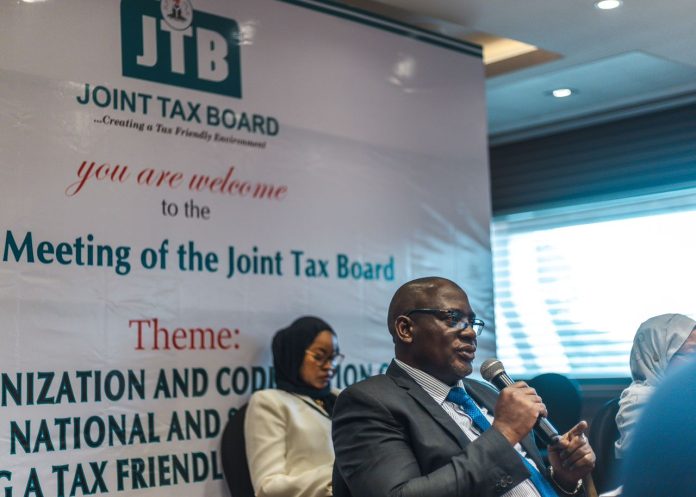In order to achieve optimal tax revenue collection across the Federal, State, and Local Government tax bodies, the Nation must embark on challenging yet essential reforms that will yield enduring advantages.
This perspective was articulated by Mr. Muhammad Nami, the Chairman of the Joint Tax Board (JTB) and also the Executive Chairman of the Federal Inland Revenue Service (FIRS), during the 153rd Board Meeting held today in Abuja.
The meeting’s theme was “Harmonization and Codification of Taxes at National and Sub-national Levels: Key to Creating a Tax-Friendly Environment in Nigeria.”
According to a statement from Johannes Oluwatobi Wojuola, the Special Assistant to the Executive Chairman on Media & Communication, Mr. Nami emphasized that for advancements in taxation to occur, tax authorities must continually explore and adopt innovative strategies and initiatives to optimize tax revenue at all levels of governance.
“As the new administrations strive to address the multifaceted socio-economic challenges facing the nation, it becomes vital for all branches of government to shed any previous sluggishness and focus on the objective of national rejuvenation.
“The distinct and privileged roles we hold as drivers of the nation’s tax administration processes present us with a unique opportunity to make tough yet necessary decisions that are projected to yield long-term benefits and contribute immensely to our collective prosperity as a country.
“In recent years, particularly since the start of our current democratic era, the significance of taxation has been consistently emphasized and underscored by all parties, and the pivotal role tax revenue plays in financing government and governance cannot be overstated.
“However, as we continue to make progress within our distinctive tax model, it is fitting that we persistently explore and adopt measures and innovative initiatives that will lead to the optimization of tax revenue for all tiers of government, in a more efficient, effective, inclusive, and sustainable manner.
“It is only through achieving this that our efforts as tax administrators can stimulate the kind of activity required in the productive sectors of our economy, working towards unlocking the substantial economic potential we are capable of,” Mr. Nami stated.
Additionally, the Chairman of the Joint Tax Board reassured the Executive Chairpersons of State Revenue Authorities in attendance that in line with the current administration’s tax policy direction, the nation was moving towards eliminating the proliferation of taxes as a fundamental element of its overarching economic revitalization goals.
Mr. Taiwo Oyedele, Chairman of the Presidential Fiscal Policy & Tax Reforms Committee, in his presentation on the meeting’s theme, highlighted that multiple taxation was dampening tax morale in the country and discouraging investments, while fostering corruption and hindering business operations.
Furthermore, the Chairman of the Presidential Fiscal Policy and Tax Reforms Committee noted that the solution to the nation’s revenue challenges did not lie in introducing more taxes, but rather in concentrating on the few high-yield taxes, as these would enable tax authorities to collect significantly more than the current figures.
Mr. Taiwo underscored that to enhance government revenue, it was necessary to reduce the total number of taxes collected at the Federal, State, and Local government levels to single digits.
“We also need to clarify taxing jurisdictions. Revenue collection functions need to be integrated—meaning that a single revenue agency should handle all revenue collection. The government should also adequately fund our tax agencies. Additionally, we need to streamline revenue administration and simplify our approach to tax compliance,” Mr. Taiwo emphasized.
He further advocated for the country’s tax authorities to harness more technology, review the nation’s constitution and tax laws, and revisit Nigeria’s concept of fiscal federalism.




